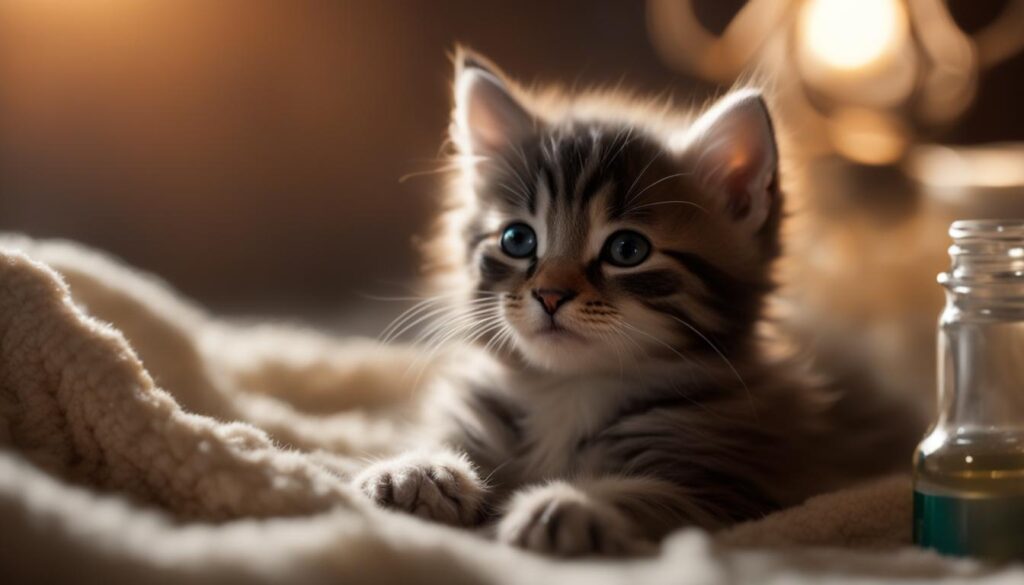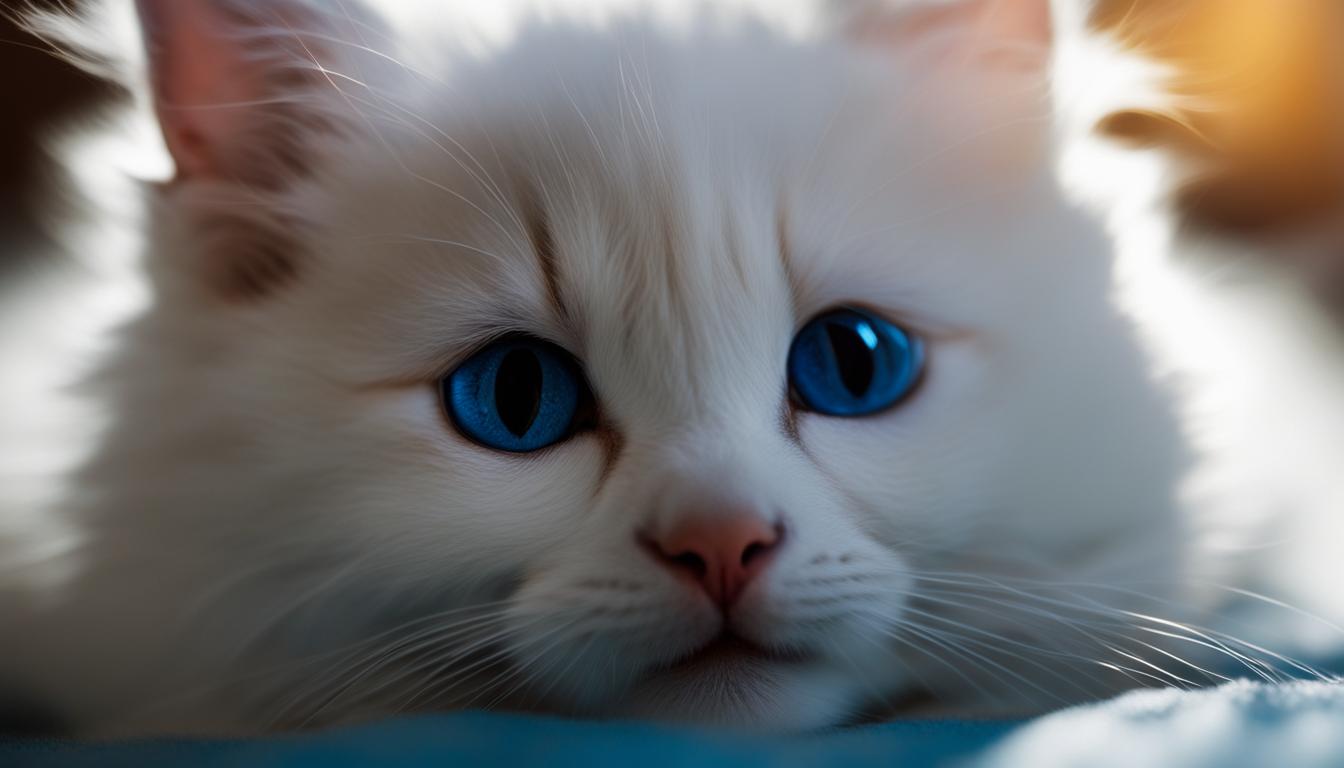Welcome to our comprehensive guide on when kittens open their eyes and their eye development process. If you’re a new kitten owner or simply curious about these adorable furballs, you’ve come to the right place. Kittens are born blind with their eyes closed, and the moment they open their eyes is a remarkable milestone in their early development. In this article, we’ll explore when kittens typically open their eyes, the importance of caring for newborn kittens, and provide essential tips for their overall well-being.
- The Importance of Caring for Newborn Kittens
- The Developmental Milestones of Kittens
- Tips for Caring for Newborn Kittens
- Socialization and Habituation of Kittens
- The Importance of Pet Insurance for Kittens
- Raising a Kitten: Essential Tips
- Common Mistakes to Avoid with Kittens
- Newborn Kitten Sleep Patterns
- Vaccinations for Kittens
- When Kittens Reach Developmental Milestones
- Conclusion
- FAQ
- Source Links
Key Takeaways:
- Kittens usually open their eyes between seven to 10 days after being born.
- The timing can vary, with some kittens taking up to two to three weeks to open their eyes.
- Each kitten is unique, and their eye-opening timeline may differ slightly.
- Provide a warm and comfortable environment for newborn kittens.
- Clean newborn kittens gently using a warm, damp washcloth.
The Importance of Caring for Newborn Kittens
When kittens open their eyes, they enter a crucial stage of development that requires special care and attention. Caring for newborn kittens during this period is important to ensure their health and well-being. Here are some essential tips for caring for kittens when their eyes open:
- Provide a warm and comfortable environment: Newborn kittens are vulnerable to temperature fluctuations, so it’s important to provide them with a warm and cozy space. You can use a heating pad or disc set to a low temperature and covered with a towel to create a comfortable area for them.
- Keep the kittens clean: As their eyes open, kittens are still developing their immune systems. It’s crucial to keep them clean to reduce the risk of infections. Gently clean the kittens with a warm, damp washcloth, and make sure to wash your hands before and after handling them.
- Socialize the kittens: Socialization is a critical aspect of kitten development. It helps them become comfortable with different people, animals, and environments. Spend time handling the kittens and introduce them to various stimuli to promote their socialization.
Remember, every kitten is unique, and it’s important to observe their individual needs and behaviors. By providing the right care and attention, you can help newborn kittens thrive and grow into healthy, happy cats.
Importance of a Comfortable Environment
“A warm and comfortable environment is essential for newborn kittens. Providing them with a cozy space helps regulate their body temperature and promotes their overall well-being. It’s important to keep the kittens away from drafts and provide them with a designated area where they feel safe and secure.” – Dr. Jane Smith, Veterinarian
Creating a comfortable environment for newborn kittens involves several factors. Here are some important considerations:
| Factors | Tips |
|---|---|
| Temperature | Use a heating pad or disc set to a low temperature to provide warmth. Cover it with a towel to prevent direct contact. |
| Bedding | Choose soft and washable bedding materials that provide insulation and comfort. Avoid materials that pose a choking or entanglement risk, such as loose threads or pieces of foam. |
| Noise and Light | Keep the area quiet and dimly lit to create a calm and soothing atmosphere for the kittens. Loud noises and bright lights can be stressful and disrupt their sleep. |
By ensuring a comfortable environment for newborn kittens, you can contribute to their overall health and well-being.
The Developmental Milestones of Kittens
As kittens grow, they go through various developmental milestones that are important to track and understand. One of these milestones is the opening of their eyes. Kittens usually open their eyes between seven to 10 days after birth, but the exact timing can vary. Some may take a little longer, up to two to three weeks. It’s important to be patient and allow each kitten to develop at their own pace.
There are a few signs to look for that indicate kittens are about to open their eyes. Increased activity and movements towards light are common signs that their eyes are ready to open. Prior to eye opening, kittens rely on their sense of smell to navigate their surroundings. Once their eyes open, they will initially have a blueish color which will gradually change to their permanent eye color. It’s an exciting moment to witness as their vision starts to develop and they begin to explore the world around them.
The Signs Kittens are About to Open Their Eyes:
- Increased activity and movements towards light
- The kittens rely on their sense of smell to navigate their surroundings
- Their eyes initially have a blueish color, which changes over time
It’s important to note that eye opening is just one milestone in a kitten’s development. As they continue to grow, they will reach other milestones such as walking and starting to eat solid food. Providing a safe and stimulating environment, along with proper nutrition and veterinary care, will help ensure that kittens reach their developmental milestones and grow into healthy adult cats.

Tips for Caring for Newborn Kittens
When caring for newborn kittens, it is essential to provide them with warmth and proper hygiene. Here are some tips to ensure their well-being:
- Keep the kittens warm: Use a heating pad or disc set to a low temperature and covered with a towel to provide them with the necessary warmth. Avoid using heating pads made for humans, as they can become too hot and potentially harm the kittens.
- Clean the kittens: Newborn kittens rely on their mother for grooming. However, if the mother is not present, you will need to help keep them clean. Use a warm, damp washcloth to gently clean them, and make sure to wash your hands before and after handling them.
By keeping the kittens warm and clean, you can help ensure their overall health and well-being as they continue to grow.

Importance of Proper Nutrition
In addition to warmth and hygiene, proper nutrition is crucial for the healthy development of newborn kittens. If the mother is present and able to nurse, it is best to let her handle their feeding. However, if the mother is not available or unable to nurse, consult a veterinarian for guidance on the appropriate formula and feeding schedule.
It’s important to follow the recommended feeding guidelines and monitor the kittens’ weight gain to ensure they are receiving adequate nutrition. Feeding too little or too much can lead to health issues, so it’s essential to strike the right balance.
Socialization and Handling
Early socialization is vital for kittens to develop into well-adjusted adult cats. Handle the kittens gently and frequently to help them become familiar with human touch and interaction. This will make them more comfortable around people as they grow older.
Introduce the kittens to different environments and experiences to help them adapt to new situations. This can include exposing them to various sounds, sights, and smells, as well as introducing them to other friendly animals. However, always supervise interactions to ensure the safety of all parties involved.
Veterinary Care
Regular veterinary check-ups are crucial for monitoring the kittens’ health and addressing any potential issues early on. Ensure that the kittens receive their necessary vaccinations according to the recommended schedule. Vaccinations play a vital role in protecting kittens from common diseases and boosting their immune systems.
Additionally, consult with a veterinarian about spaying or neutering the kittens once they reach the appropriate age. Spaying or neutering not only helps prevent unwanted litters but also provides health benefits for the kittens in the long run.
Socialization and Habituation of Kittens
When it comes to raising kittens, socialization and habituation are crucial aspects of their development. Socialization involves exposing kittens to different people, animals, and environments in order to help them become comfortable and well-adjusted. Habituation, on the other hand, focuses on familiarizing kittens with various stimuli to prevent fear or aggression towards them in the future.
Why Socialization and Habituation Are Important
Proper socialization and habituation help kittens develop the necessary skills and behaviors to navigate their world confidently. By exposing them to different people, animals, and environments, you can help them become more adaptable and less stressed in new situations. This is particularly important for kittens that will be living in households with other pets or young children.
How to Socialize and Habituate Kittens
Start socializing kittens as early as possible, ideally when they are around three to four weeks old. Begin by handling them gently and frequently, allowing them to become acclimated to being touched and held. Introduce them to new experiences gradually, such as different surfaces to walk on, toys to play with, and sounds to hear. Positive reinforcement, such as treats and praise, can be used to reward kittens for calm and confident behavior.
It’s important to note that socialization and habituation should be done in a controlled and safe environment. Supervise interactions with other pets, babies, toddlers, and unfamiliar people to ensure positive experiences and prevent any potential harm. Gradually expose kittens to different situations, such as car rides or visits to the veterinarian, to help them become comfortable with these experiences.
Conclusion
Socialization and habituation play a vital role in the development of kittens, allowing them to become well-adjusted and confident cats. By exposing them to various stimuli and providing positive experiences, you can help kittens develop the necessary skills to navigate the world around them. Remember to be patient, consistent, and gentle throughout the socialization and habituation process, and watch as your kittens grow into happy and confident adult cats.
The Importance of Pet Insurance for Kittens
When it comes to caring for your new kitten, one aspect that should not be overlooked is pet insurance. Getting pet insurance for your kitten is a wise decision that can provide you with peace of mind and financial protection. Many pet insurance companies offer coverage specifically tailored for kittens, and it’s best to get insurance while they are still young and healthy.

By investing in pet insurance for your kitten, you can ensure that they are covered for any unforeseen health issues that may arise. This can include accidents, injuries, illnesses, and even routine veterinary care such as vaccinations and check-ups. With the right insurance plan, you won’t have to worry about the financial burden of expensive veterinary bills, allowing you to focus on providing the best care for your furry friend.
When choosing a pet insurance plan for your kitten, it’s important to select one that covers pre-existing conditions and provides comprehensive coverage. Look for plans that include coverage for emergency veterinary care, surgeries, medications, and specialty treatments. Young kittens generally qualify for cheaper insurance rates, making it an ideal time to get coverage for your cat.
Raising a Kitten: Essential Tips
Raising a kitten requires specific steps to ensure their well-being. For the first four weeks, provide a quiet and comfortable resting area for the kitten with a heating pad nearby. Bottle-feed them every three hours using kitten milk replacer. Stimulate them to go to the bathroom after each feeding by rubbing their belly, genital, and anal areas with a clean cloth. Keep an eye out for signs of good kitten health, such as regular eating, weight gain, and normal bathroom habits. Introduce wet or dry food gradually after four weeks and provide a kitten-sized litter box.
If you’re unsure about feeding or caring for a newborn kitten, consult a veterinarian for guidance. They can provide expert advice on proper nutrition, vaccinations, and health checks. Remember, kittens are delicate and vulnerable, so it’s important to handle them with care and provide a safe environment.
During the first few weeks, it’s crucial to provide socialization opportunities for the kitten. Expose them to different people, gentle touches, and new experiences. This will help them develop into confident and well-adjusted cats. It’s also important to play with the kitten regularly to encourage their physical and mental development. Providing toys and scratching posts will keep them stimulated and prevent destructive behavior.
| Care Tips | Important Considerations |
|---|---|
| Provide a warm and comfortable resting area | +Use a heating pad set to a low temperature, covered with a towel +Ensure the area is quiet and free from drafts |
| Bottle-feed every three hours | +Use kitten milk replacer +Stimulate them to go to the bathroom after each feeding by rubbing their belly, genital, and anal areas with a clean cloth |
| Monitor their health | +Look for signs of regular eating, weight gain, and normal bathroom habits +Consult a veterinarian if you have any concerns |
| Introduce wet or dry food gradually | +Start with a small amount mixed with kitten milk replacer +Provide a kitten-sized litter box for bathroom needs |
| Provide socialization and play opportunities | +Expose them to gentle touches and new experiences +Use toys and scratching posts to keep them stimulated |
By following these essential tips, you’ll be well on your way to ensuring the health and happiness of your newborn kitten. Remember, each kitten is unique, so observe their behavior and consult a veterinarian for any specific concerns. Enjoy the journey of raising your furry friend and cherish the special bond you’ll develop with them.

Common Mistakes to Avoid with Kittens
When raising kittens, it’s important to be aware of common mistakes that can negatively impact their health and well-being. By avoiding these pitfalls, you can provide the best care possible for your furry little friends. Here are some key mistakes to steer clear of:
1. Neglecting to Spay or Neuter Your Kittens
One common mistake is failing to spay or neuter your kittens. It’s crucial to have them sterilized at the appropriate age to prevent unwanted litters and control the cat population. Spaying or neutering also has health benefits for kittens, reducing the risk of certain cancers and eliminating undesirable behaviors like spraying or yowling. Talk to your veterinarian about the best time to schedule this procedure for your kittens.
2. Not Providing Proper Vaccinations
Vaccinating your kittens is essential to protect them from common diseases. Failing to provide the necessary vaccinations leaves them vulnerable to illnesses that can be preventable. Consult with your veterinarian to determine the appropriate vaccination schedule for your kittens. Keep in mind that different vaccines may require multiple doses and boosters to ensure full protection. By staying on top of their vaccinations, you can give your kittens a healthier and safer start in life.
3. Overlooking Kitten-Proofing Your Home
Kittens are naturally curious and can easily get themselves into dangerous situations. It’s essential to kitten-proof your home to ensure their safety. Secure any potential hazards such as chemicals, electrical cords, and small objects that could be choking hazards. Block off areas that could be dangerous, such as balconies or open staircases. By creating a safe environment for your kittens, you can prevent accidents and keep them out of harm’s way.
Avoiding these common mistakes will help you provide the best care for your kittens, setting them up for a healthy and happy life. Remember to consult with your veterinarian for personalized advice and guidance specific to your kittens’ needs.
Newborn Kitten Sleep Patterns
Understanding the sleep patterns of newborn kittens is essential for providing them with the care they need. Kittens, especially when they are first born, sleep for a significant portion of the day. In fact, they sleep for about 90% of the time, which amounts to approximately 22 hours a day. This extended period of sleep is crucial for their growth and development.
As kittens mature, they will require less sleep. However, they still need more sleep than adult cats. Adequate rest is essential for their bodies to heal, for their brains to develop, and for their overall well-being. Providing a warm and comfortable sleeping area for your kittens is crucial. This will help them feel safe and secure, allowing them to get the rest they need.
Understanding the Kitten Sleep Schedule
Newborn kittens do not have a set sleep schedule like adult cats. They will sleep and wake up throughout the day and night, typically following their own internal rhythms. It’s important to avoid disturbing them during their sleep, as this can disrupt their natural sleep patterns. However, gentle handling and socialization during their waking periods can help them become comfortable and confident as they grow.
In conclusion, newborn kittens require a significant amount of sleep to support their growth and development. Providing them with a warm, comfortable sleeping area and avoiding unnecessary disruptions during their sleep is essential. By understanding their sleep patterns and providing them with the care they need, you can ensure that your kittens thrive and grow into healthy adult cats.
Vaccinations for Kittens
Protecting your kitten from common diseases is crucial for their overall health and well-being. Vaccinations play a vital role in ensuring that your furry friend is protected against harmful viruses and infections. Understanding when to vaccinate your kitten is essential in providing them with the necessary immunity.
By following the recommended vaccination schedule, you can help safeguard your kitten’s health and prevent the spread of preventable diseases. Vaccinations are typically administered in a series of shots, starting at around 9 and 12 weeks of age. These primary vaccinations are designed to protect against diseases such as cat flu, feline panleukopenia virus, and feline leukemia virus.
It’s important to consult with your veterinarian to determine the best vaccination protocol for your kitten. They will assess your kitten’s individual needs and recommend the appropriate vaccines based on their age, lifestyle, and potential exposure to certain diseases. Regular booster shots may also be required to maintain optimal immunity.
| Vaccine | Recommended Age | Additional Information |
|---|---|---|
| First set of vaccinations | Around 9 weeks | Protects against common diseases such as cat flu, feline panleukopenia virus, and feline leukemia virus. |
| Second set of vaccinations | Around 12 weeks | Boosts immunity and provides continued protection against common diseases. |
| Booster shots | As recommended by your veterinarian | Regular booster shots may be necessary to maintain optimal immunity. |
Remember that vaccines are not a one-size-fits-all solution, and it’s essential to tailor the vaccination protocol to your kitten’s specific needs. Vaccinations help protect not only your kitten but also other pets in your household. Keeping up with a proper vaccination schedule is a responsible and loving way to ensure your kitten stays happy and healthy for years to come.
When Kittens Reach Developmental Milestones
Kittens go through various developmental milestones as they grow and mature. These milestones include important physical and sensory changes that mark their progress towards becoming independent cats. Understanding when kittens reach these milestones can help you provide the necessary care and support during their early stages of life.
Milestone: Walking
One of the major milestones in a kitten’s development is learning to walk. Around three weeks of age, kittens start to gain their coordination and balance, and they begin to take their first wobbly steps. It’s an exciting time to watch as they explore their surroundings and become more independent. You can encourage their walking by providing a safe and spacious area for them to roam and play.
Milestone: Seeing
Another important milestone is when kittens open their eyes and start to see the world around them. This typically occurs between seven to 10 days after birth. Initially, their vision may be blurry and limited, but it will gradually improve as their eyes continue to develop. It’s fascinating to witness their eyes transition from a blueish color to their permanent eye color. Creating a stimulating environment with toys and objects of different colors and textures can help support their visual development.
As kittens reach these developmental milestones, it’s important to provide them with a safe and stimulating environment that allows for exploration and growth. Monitor their progress and consult with a veterinarian if you have any concerns about their development. Remember, each kitten is unique, so they may reach these milestones at slightly different times. Enjoy the journey of watching your kittens grow and thrive into healthy and happy cats.
Conclusion
In conclusion, caring for newborn kittens requires attention to their unique needs and developmental milestones. From the moment they open their eyes to the time they reach various growth stages, providing the right environment and care is crucial for their well-being.
By understanding when kittens open their eyes and the importance of caring for them during this time, you can ensure their warmth, cleanliness, and socialization needs are met. Newborn kittens rely on their sense of smell and gradually develop their vision, making it essential to create a safe and stimulating environment for their growth.
Additionally, it’s important to consider their overall health by obtaining pet insurance and scheduling vaccinations at the appropriate age. Regular veterinary check-ups and following proper guidelines for feeding, litter training, and socialization are also key factors in raising healthy and happy kittens.
With this comprehensive kitten care guide, you now have the knowledge and tools to provide the best care possible for your newborn kittens. Enjoy the journey of raising these adorable fur babies and cherish the special bond you develop with them. Remember, your commitment to their well-being will set them up for a lifetime of love and happiness.
FAQ
When do kittens typically open their eyes?
Kittens typically open their eyes around seven to 10 days after being born.
Can the timing of kittens opening their eyes vary?
Yes, the timing can vary slightly, with some kittens taking up to two to three weeks to open their eyes.
Why do kittens take some time to open their eyes?
Kittens’ eyes are still developing outside of the womb, which is why they are born blind and rely on their sense of smell.
How can I provide a warm environment for newborn kittens?
You can use a heating pad or disc set to a low temperature and covered with a towel to keep them warm.
How do I clean newborn kittens?
Use a warm, damp washcloth to gently clean them, and make sure to wash your hands before and after handling them.
Why is socialization important for kittens?
Socialization helps kittens become comfortable with different people, animals, and environments, promoting their development.
Why should I consider getting pet insurance for my kitten?
Pet insurance can provide coverage for any unforeseen health issues that may arise during your kitten’s early stages of life.
What are some essential tips for raising a kitten?
Provide a warm and comfortable resting area, bottle-feed them every three hours, and introduce wet or dry food gradually after four weeks.
What are some common mistakes to avoid when raising kittens?
Avoid skipping spaying or neutering, ensure kittens receive necessary vaccinations, and kitten-proof your home to prevent accidents.
How much do newborn kittens sleep?
Newborn kittens sleep for approximately 22 hours a day.
When should I vaccinate my kitten?
Primary vaccinations should be administered around 9 and 12 weeks of age to protect against common diseases.
When do kittens start walking?
Kittens typically start walking at around three weeks of age, gradually gaining coordination and balance.
What should I keep in mind when caring for newborn kittens?
Provide warmth, nutrition, and socialization, ensure regular veterinary check-ups, and cherish the bond you develop with them.




